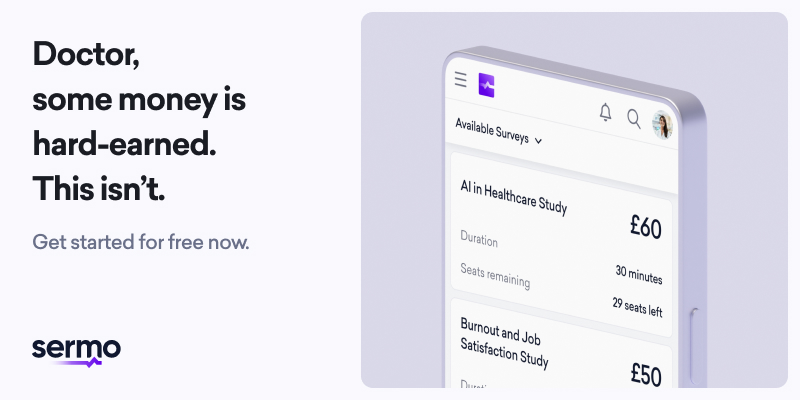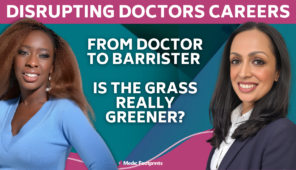Alternative Careers for Doctors: The Ultimate List
Reconsidering your career path as a medic? We explore the vast range of alternative careers for doctors with some top tips of where to begin

Many doctors reach a point in their medical career when they pause, reflect and think, “Is this it?” They feel dissatisfied for many reasons and do not know where to turn to for information and support. That’s where we step in! Medic Footprints is a doctor-led organisation focused on supporting the career and lifestyle needs of medics. Let’s start at the very beginning, looking at the vast non-exhaustive range of ‘common’ alternative careers for doctors…
Alternative Careers for Doctors

- Aesthetics – Aesthetic medicine involves the use of minimally invasive procedures to change an individual’s appearance, including botox dermal fillers, chemical peels and non-surgical rhinoplasty! For some it can be a great sideline business, and for others progress to creating their very own training academy!
- Aviation Medicine – involves looking at the health and safety of crew and passengers in flight, fitness to fly, physiology of man in space, and the application of clinical medical knowledge to the practice of aviation medicine. Sound exciting? We have our very own Aviation Medicine career guide coming soon!
- Career coaching – Becoming a career coach is an increasingly popular avenue for doctors — it’s an interesting and satisfying way of using well-honed communication skills to help others, with some familiarity in using a consultation setting to assist someone else in dealing with the issues in their life.
- Civil service – The civil service has many departments that may be of interest to doctors such as the Department of Health & Social Care, Health Protection Agency, Healthcare Commission, Medical Research Council. Not only are they looking for experienced professionals, they have Fast Track programmes for graduates.
- Clinical academics – a doctor of any speciality who combines their work with research and teaching responsibilities. The integrated academic pathway offers a route into academics medics at any stage of their career.
- Complementary Medicine – involves treatments used alongside conventional medical treatments, such as osteopathy, chiropractic, herbalism, homeopathy, and acupuncture.
- Defence medical services – deliver medical support to the Royal Navy, the British Army and the Royal Air Force (RAF). You could be an army officer and a doctor, providing medical care for soldiers and their families, within the UK or abroad. Furthermore, you can apply at any stage of your medical career and it does not need to be a long-term commitment.
- Diving Medicine – Diving medics are involved in “fitness to dive” medicals, treat diving-related injuries such as decompression illness, and perform training and research.
- Doctorpreneur – it all starts with a great idea! Why not be a doctor come entrepreneur? Many doctors start their own company or business, seeking to make a profit or a difference in the world, or both!

- Expedition Medicine – provide medical care to organised groups exploring some amazing remote locations, from desert to mountain tops! The Medic Footprints guide on how to be an expedition medic is coming very soon…watch this space.

- Forensic Medical Examiner – Work as a FME can range from dealing with patients in police custody to victims of sexual offences; helping people at a critical point in their lives. The majority of forensic medicine is within private companies such as G4, Mite, CRG and Mountain Healthcare. Most of these companies provide training to doctors after completion of FY2.
- Functional assessor – The Independent Assessment Services (delivered by ATOS) and MAXIMUS recruit doctors to carry out assessments for the Department for Work and Pensions (DWP). This usually would involve long clinical appointments with patients to assess their eligibility for benefits.
- Functional medicine – Increasing in popularity over the past few years, functional medicine is a systems biology-based approach that focuses on identifying and addressing the root cause of disease. There are functional medicine clinics cropping up all over the country, with many doctors starting their own private practice. The Institute for Functional Medicine (based in the USA) provides UK training at the annual AFMCP 5 day course.

- Health Economics – a branch of economics looking at the effectiveness, efficiency and value within healthcare systems.
- Health Policy – looks at plans, actions and goals with a healthcare system and within society. It aims to set out a vision for the future and establish short and medium term goals on how to meet targets.
- Health Technology – From apps, to record systems, to medical appliances and machine learning, health tech is a growing, popular field for many doctors. As a doctor you will have been able to see how technological innovations, or lack of them, have impacted on patient care and experience of healthcare. Can you help? The Association of British Health Tech Industries is a really useful resource. As well as our ultimate guide on the fundamentals for a career in health tech as a doctor!
- Integrative Medicine – a broad specialty encompassing many different therapeutic modalities including conventional medicine, nutrition, lifestyle and functional medicine, acupuncture, naturopathy, herbal medicine, homeopathy , bodywork i.e. yoga and mindfulness, and traditional healing practices such as Ayruvedic and Traditional Chinese Medicine.
- Lifestyle Medicine – Lifestyle medicine is all about supporting patients to make better choices when it comes to diet, exercise, alcohol, sleep and mental health/positive psychology can help manage and even reverse disease. Rather than placing blame, it’s about empowering patients, sharing evidence-based knowledge, and supporting health behaviour change. Check out the British Society of Lifestyle Medicine for more on membership and diploma certification. Medic Footprints have a career guide on how to have a successful career in lifestyle medicine.

- Management Consultancy – Management consultants are employed by organisations to provide an objective overview of their company, to identify any strengths and weaknesses, and to develop strategies to facilitate improvement and progression. Opportunities for career progression and lucrative salary makes a move into the corporate world an attractive option for many doctors seeking to diversify their career or leave medicine completely. Check out our guide on discovering Management Consultancy as a career for doctors.
- Medical Education – a broad and far-reaching field, with the main aim being to train, inspire and motivate medical students and doctors. There are so many ways to get involved including, lecturing, creating and running courses, writing exam questions, or even adopting roles such as the Director of Postgraduate Medical Education! Check out our guide for everything you need to know about a career in medical education.
- Medical Illustration – A medical illustrator is a professional artist who interprets and creates visual material to help document and share medical knowledge.
- Medical Journalism – Medical journalists write articles on medical matters for media such as newspapers and journals, as well as TV and radio media.
- Medical Politics & Ethics – If you are looking to make a difference to patient care or healthcare workers, then as a doctor you could get involved in strategy development, medical ethics, work with medical defense unions, research and risk management. Many doctors do this alongside their clinical work. There are courses in medical ethics which may be a good starting point, but even getting involved in medical bodies or the BMA could provide a good foundation.

- Medical Research – The planning and conducting of experiments to collect data to improve scientific knowledge in the medical field. Having audit and research experience is desirable as well as experience in writing grant applications, but not always a requirement. There are some PhD studentships which allow you to study for a PhD whilst carrying out research work.
- Medical Translation – the translation of medical documents into other languages. Translation work can vary from pharmaceutical products to consent forms! As a doctor, you already have a good foundation of medical terminology, so if you possess a high-level of knowledge of another language, then medical translation could well be for you.

- Medical Tribunal Member – This is an opportunity for doctors to sit on a panel to give a medical opinion on appeals about disability benefits. The Judicial Appointments Commission goes through a recruitment cycle every couple of years. You can sign up to their newsletter and keep an eye out for the advertisement of “fee paid medical member of the first tier tribunal”.
- Medical Writing – Working within the medical writing or medical communications field (generally known as MedComms) is an excellent way for doctors to supplement their clinical work, or to change careers completely whilst continuing to use their medical knowledge. The work is technically challenging with the pressure of tight deadlines, and ultimately aims to improve both professional and public understanding of science and medicine through effective communication. Check out our Career Guide on how to develop your career as a medical writer.
- Medico-legal – With the number of legal processes involving the NHS increasing every year, the medico-legal sector is a rapidly evolving and exciting area to work in. The work is generally varied and mixes urgent and non-urgent components. Check out our Career Guide for everything you need to know about a medico-legal career as a doctor!
- NHS Graduates Scheme – For those interested in management roles, the NHS offers graduate training schemes in human resources general management, finance, health analysis, health informatics and strategy.

- Occupational Medicine – Occupational Health Physicians (OHP)generally work in a consultancy or advisory capacity, meaning they are non-prescriptive and provide advice to an employer on the management of an individual or workforce, depending on the setting. Medic Footprints founder and director, and occupational health physician, Dr Abeyna Bubbers-Jones, shares The Insiders Guide to Occupational Medicine right here.
- Pharmaceuticals – “Pharma” is a term most commonly applied to the pharmaceutical industry. There many varied roles for doctors in pharma including clinical pharmacology, research, medical advisory, medical affairs, medicines safety. There is even a specialist training pathway in pharmaceutical medicine, which is not necessarily widely known about by many doctors! Check out our Ultimate Guide to a Career in Pharma as a doctor.
- Prison Health Service – Doctors that work within the prison health service are either part of a speciality training rotation or qualified GPs, however there are also roles from a drug-use and mental health perspective. You would usually need experience in primary care, emergency medicine, communicable diseases, drug use and mental health, however there is a course in prison medicine (free!) which covers all human rights and ethics which may be useful.

- Property Investment – Buy to Let is probably the most well-known option for investing in property, and more and more are getting on the property train as a means of passive income. Check out our webinar on all the insider tips on property investment for doctors. Our full guide is coming soon!

- Public Health – a speciality looking at the health of a general population rather than at an individual level. It’s all about preventing disease, managing outbreaks, and health promotion to the whole population. There is a public health speciality training pathway, as well as a portfolio route to being a Public Health consultant.

- Sport & Exercise Medicine – physicians who are trained in the delivery of musculoskeletal and exercise medicine and team care. There are an increasing number of posts cropping up within the NHS for NHS Sports & Exercise physicians delivering exercise medicine services and musculoskeletal services. You can also find opportunities within sports teams such as football clubs, the armed forces, universities and within the private sector. The Medic Footprints guide to sports medicine is coming soon!
- Travel Medicine – a broad speciality containing infectious diseases, tropical medicine, public health, occupation medicine and primary care. The London School of Hygiene & Tropical Medicine and the Liverpool School of Tropical Medicine offer various courses and programmes. Check out our article on the Diploma in Tropical Medicine and Hygiene (DTM&H), the perfect stepping stone into travel medicine and working in tropical climates.
- Volunteering Abroad – Are you interested in providing medical aid anywhere in the world, for the most vulnerable communities? There are plenty of opportunities to get involved in medical response teams for crises and disasters around the world, with companies synch as Medecins Sans Frontieres (MSF), REDR UK and VSO international. There is a Diploma in the Medical Care of Catastrophies by the Apothecaries which may be of interest to those who are interested in getting involved in joining medical response teams.
Or something completely non-medical like opening up a cafe or graphic design business!

Medics possess so many important skills, many of which are transferable to other professions. There are also a number of things to consider when trying to find the right career path for you and key questions to ask yourself when thinking about alternative careers for doctors. We are here to help!
Medic Footprints is a doctor-led organisation focusing on alternative careers for doctors and wellbeing. Have a browse around our resources for more inspiration but if you can’t find what you’re looking for, please get in touch.
Listen to our Alternative Careers that Pay Well podcast
Edsel Dichoso
Latest posts by Edsel Dichoso (see all)
- Doctor Industry Expansion Associate (Application is now closed) - 21st March 2025
- Fellowship Growth & Success Manager (Application is now closed) - 28th November 2024
- From Doctor to Barrister – is the grass really greener? – with Dr. Urmila Roy - 18th October 2024



